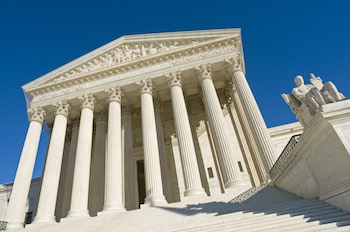 The IPO recently filed an amicus brief at the Supreme Court in Kirtsaeng v. John Wiley & Sons, Inc. supporting a flexible approach to awarding attorneys’ fees. Oral argument is currently scheduled for April 25, 2016.
The IPO recently filed an amicus brief at the Supreme Court in Kirtsaeng v. John Wiley & Sons, Inc. supporting a flexible approach to awarding attorneys’ fees. Oral argument is currently scheduled for April 25, 2016.
This case presents an important opportunity for the Supreme Court—consistent with its holding in Fogerty v. Fantasy, Inc., 510 U.S. 517, 534 (1994)—to resolve a circuit split regarding how to weigh equitable factors in awarding attorneys’ fees in copyright cases. Attorneys’ fees should be based on a review of all equitable factors and not a product of a formulaic approach that disproportionately weighs certain factors more than others. Each case should be reviewed under the discretionary standards provided under the statute. See 17 U.S.C. § 505. A uniform standard would place all litigants in copyright cases on the same footing in requesting attorneys’ fees.
Under copyright law, a court may exercise equitable discretion to award attorneys’ fees based on the objective unreasonableness of the claims and other factors, in a way that is “faithful to the purposes of the Copyright Act” and evenhanded to plaintiffs and defendants. Fogerty, 510 U.S. at 534 n.19. This Court has clarified that the Copyright Act’s purpose is “more complex, more measured” than “maximizing meritorious infringement suits.” See id. at 526. It has also rejected using a “precise rule or formula” for making fee determinations. See id. at 534.
Kirtsaeng appealed from the Second Circuit, which affirmed the district court’s ruling that denied him attorneys’ fees. The Second Circuit always gives the objective-unreasonableness factor substantial weight. It reasons that the purpose of the Copyright Act would typically not be served by assessing a copyright holder a fee for pursuing an objectively reasonable claim. Although the objective-unreasonableness factor should be considered, the automatic heavy weighting of this factor does not allow other equitable factors to be properly considered. Other circuits also follow formulaic approaches to awarding attorneys’ fees to prevailing parties, without properly considering equitable factors on a case-by-case basis.
IPO seeks a deep look at this issue. It hopes that the Court will take this opportunity to review the current state of attorneys’-fee law in the various circuits and provide a flexible and case-specific approach to fee awards that rejects formulas and precise rules.
Summary of IPO’s Arguments
- A review of the circuits reveals divergent applications of the equitable factors with the Ninth Circuit approach following Fogerty and rejecting a formulaic approach that does not take into account all equitable factors.
The Ninth Circuit has held that “[f]aithfulness to the purposes of the Copyright Act is . . . the pivotal criterion” in the attorneys’-fee analysis. Berkla v. Corel Corp., 302 F.3d 909, 923 (9th Cir. 2002). It has also explained that it evaluates whether fee awards are evenhanded. See Fantasy, Inc. v. Fogerty, 94 F.3d 553, 559 (9th Cir. 1996). In other words, its approach tracks exactly with the Supreme Court’s Fogerty opinion. Moreover, the Ninth Circuit’s approach is flexible and allows a court to consider all factors, so long as “they further the purposes of the Copyright Act and are evenhandedly applied.” See Fantasy, 94 F.3d at 558. Because the Ninth Circuit’s approach is flexible, a party can make an argument to convince a court that—in the particular case before it—the objective-unreasonableness factor should be given substantial weight: “While no longer a prerequisite to a fee award, the objective unreasonableness . . . of a losing party’s claim can be a relevant indicator of whether the Act’s primary objective is being served by the litigation.” See SOFA Entm’t, Inc. v. Dodge Prods., 709 F.3d 1273, 1280 (9th Cir. 2013) (internal quotations omitted). Thus, this approach allows courts to flexibly exercise their equitable discretion by avoiding a rigid rule that the objective-unreasonableness factor must be or must never be given substantial weight.
- A formula that requires giving substantial weight to the objective-unreasonableness factor when assessing attorneys’ fees should be rejected.
The Second Circuit requires its district courts to use a precise rule to decide whether to grant attorneys’ fees in copyright cases. The Second Circuit always gives the objective-unreasonableness factor substantial weight. This approach prevents trial courts from giving less weight to the objective-unreasonableness factor, even if the facts before the trial court call for less weight to be given to that factor. It creates a rigid framework that a trial court must use when evaluating relevant factors. Other factors, such as bad faith, litigation conduct, and the motivation behind the action, are diminished even if more important to the particular case. An approach like this one, which prescribes a “precise rule” for what weight to give a particular factor—regardless of the particular circumstances of the case—should be rejected by the Supreme Court.
- Presumptions in favor of fees should be rejected.
The Seventh Circuit and the Fifth Circuit have created a presumption in favor of granting fees to the prevailing party. This approach—by favoring certain outcomes at the beginning—is not flexible. And it does not give trial courts the opportunity to appropriately weigh other relevant facts and circumstances against the fact that the prevailing party won. Absent the formulaic presumption in favor of fees, a court might view other facts, circumstances, or factors as more significant and decisive in favor of not granting attorneys’ fees. The Supreme Court has previously rejected restraining a trial court’s equitable discretion in this way, and it should do so again here. See Fogerty, 510 U.S. at 534.
- The objective-unreasonableness factor can be given substantial weight by the trial court while assessing other equitable factors.
The trial court should have the flexibility when exercising its equitable jurisdiction to decide whether to give substantial weight to this factor. It has the most intimate knowledge of the parties, the arguments, and the proceedings to determine whether the objective unreasonableness factor should be given substantial weight. This kind of flexibility is in accord with the Court’s reasoning in Fogerty and in other intellectual property cases involving equitable discretion. See eBay v. MercExchange, 547 U.S. 388 (2006); see also Octane Fitness, LLC v. ICON Health & Fitness, Inc., 134 S. Ct. 1749 (2014).

![[IPWatchdog Logo]](https://ipwatchdog.com/wp-content/themes/IPWatchdog%20-%202023/assets/images/temp/logo-small@2x.png)

![[Advertisement]](https://ipwatchdog.com/wp-content/uploads/2024/04/Patent-Litigation-Masters-2024-sidebar-early-bird-ends-Apr-21-last-chance-700x500-1.jpg)

![[Advertisement]](https://ipwatchdog.com/wp-content/uploads/2021/12/WEBINAR-336-x-280-px.png)
![[Advertisement]](https://ipwatchdog.com/wp-content/uploads/2021/12/2021-Patent-Practice-on-Demand-recorded-Feb-2021-336-x-280.jpg)
![[Advertisement]](https://ipwatchdog.com/wp-content/uploads/2021/12/Ad-4-The-Invent-Patent-System™.png)







Join the Discussion
No comments yet.